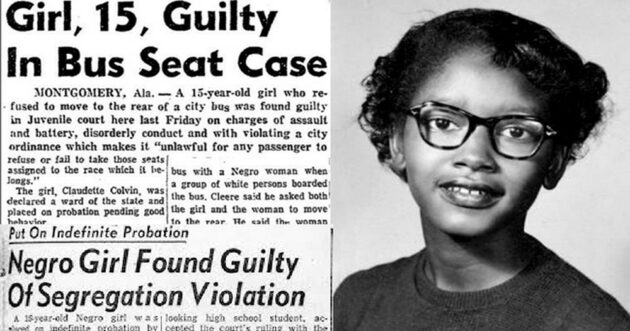Whatever may be said of its modern offspring, the Civil Rights movement of the 1950s and ’60s is one of the great moments in American history. Contrary to the hateful narrative of the fraudulent 1619 Project and the racist Marxism of Black Lives Matter, the Civil Rights movement is a shining example of what indeed makes America great: its willingness to confront its problems and overcome them.
For good reason, then, Civil Rights leaders such as Martin Luther King Jr or Rosa Parks are celebrated today as American heroes. (Notwithstanding, of course, that people like King were human beings with failings no better than other American heroes the modern left now revile, such as Thomas Jefferson.)
But there were many people involved in Civil Rights movement, some of whom are barely remembered today. Their consignment to the back pages of history, even as they were making history, shows that the Civil Rights movement was, and is not free from its own prejudices.
One of them is Claudette Colvin.

Rosa Parks, the “first lady of the Civil Rights movement”, first came to prominence for her celebrated refusal to sit in the “Colored” section of a bus in Montgomery, Alabama, in 1955. The subsequent Montgomery Bus Boycott was a key moment in Civil Rights.
But Rosa Parks was not the first black person to refuse to sit at the back of a Montgomery bus in 1955.
Nine months before Rosa Parks, a 15-year-old black girl named Claudette Colvin refused to move to the back of the bus. Disgusted with segregation, she told the driver that it was her constitutional right to sit where she pleased. Police were called, and Colvin, her school books scattered, shouting, “It’s my constitutional right!”, was dragged away.
It’s an astonishing and stirring story — so why didn’t Colvin spark protests and become one of the iconic figures of Civil Rights?
Because she was the “wrong” type of black girl, even for the Civil Rights leaders. She was, she says, too young, too dark — and, within a few months of her bus protest, pregnant. By contrast, Parks was a lighter-skinned and respectable, older, working woman.
But Colvin felt the injustices as strongly as anyone: from the execution of her neighbour for allegedly raping a white woman, to something as trivial as buying shoes.
“You had to take a brown paper bag and draw a diagram of your foot … and take it to the store. Can you imagine all of that in my mind?” As she testified in Browder v. Gayle, the Supreme Court case that overthrew bus segregation, “We were treated wrong, dirty, and nasty”.
Another name that should be, but isn’t, widely celebrated is Bayard Rustin.

Rustin was in many ways Martin Luther King’s mentor. Rustin was a Quaker who had travelled to India to learn first-hand about Ghandi’s ahimsa non-violence doctrine. Rustin was influential in King adopting non-violent resistance — a stance which was ultimately more massively successful in winning over other Americans than any number of riots.
Rustin was also the architect of the 1963 March on Washington, where King delivered his timeless “I have a dream…” speech.
In fact, Rustin had envisioned a march on the nation’s capital as early as 1941, to protest against segregation in the defense industry. The mere threat of the march led to Roosevelt bowing to their demands, with Executive Order 8802: Prohibition of Discrimination in the Defense Industry.
When the 1963 march was being planned, organisers turned to Rustin, who is said to have organised the entire episode in just eight walks. Yet, despite that, Rustin was not officially put in charge, forced to work behind the scenes, while King and A. Philip Randolph were the official faces of the march.
So, why was Rustin relegated to the sidelines despite his work, and remains largely forgotten today?
Because he was homosexual.
Many black leaders were uncomfortable with Rustin’s sexual orientation. In 1960, Black congressman Adam Clayton Powell Jr. forced Rustin to resign from the leading Civil Rights organisation, the Southern Christian Leadership Conference (SCLC). Powell threatened to tell the press that Rustin and King were lovers. Notorious Dixiecrat, Senator Strom Thurmond, publicly labelled Rusin a “sex pervert”.
When Civil Rights leaders were received at the White House, following the March on Washington, Rustin was not among them.
Please share this article so that others can discover The BFD

